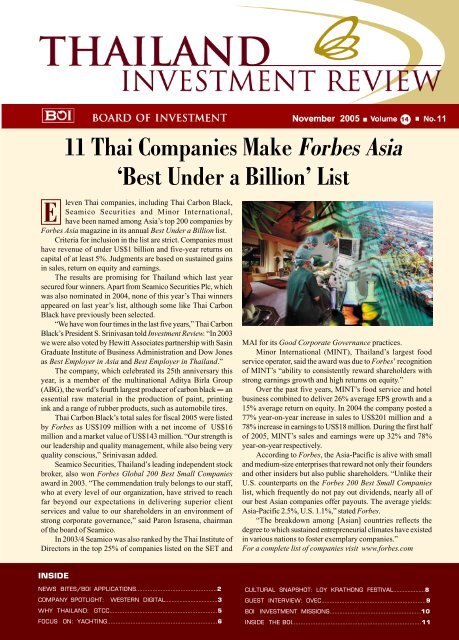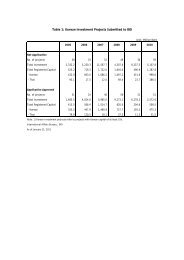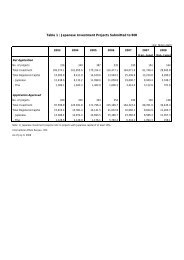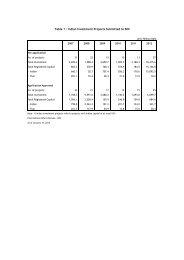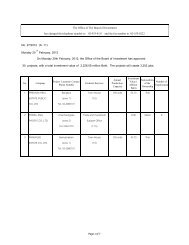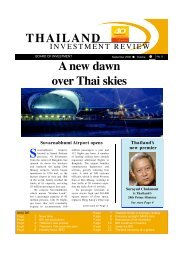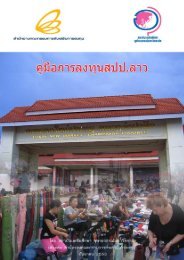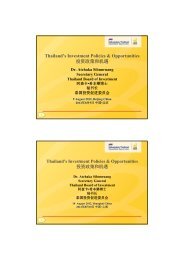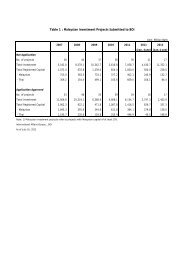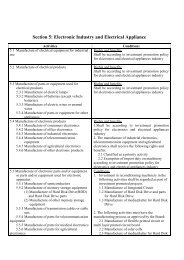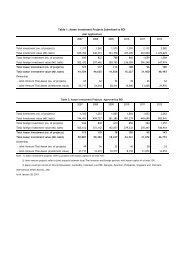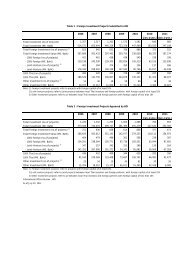11 Thai Companies Make Forbes Asia 'Best Under a Billion' List
11 Thai Companies Make Forbes Asia 'Best Under a Billion' List
11 Thai Companies Make Forbes Asia 'Best Under a Billion' List
Create successful ePaper yourself
Turn your PDF publications into a flip-book with our unique Google optimized e-Paper software.
E<br />
<strong>11</strong> <strong>Thai</strong> <strong>Companies</strong> <strong>Make</strong> <strong>Forbes</strong> <strong>Asia</strong><br />
‘Best <strong>Under</strong> a Billion’ <strong>List</strong><br />
leven <strong>Thai</strong> companies, including <strong>Thai</strong> Carbon Black,<br />
Seamico Securities and Minor International,<br />
have been named among <strong>Asia</strong>’s top 200 companies by<br />
<strong>Forbes</strong> <strong>Asia</strong> magazine in its annual Best <strong>Under</strong> a Billion list.<br />
Criteria for inclusion in the list are strict. <strong>Companies</strong> must<br />
have revenue of under US$1 billion and five-year returns on<br />
capital of at least 5%. Judgments are based on sustained gains<br />
in sales, return on equity and earnings.<br />
The results are promising for <strong>Thai</strong>land which last year<br />
secured four winners. Apart from Seamico Securities Plc, which<br />
was also nominated in 2004, none of this year’s <strong>Thai</strong> winners<br />
appeared on last year’s list, although some like <strong>Thai</strong> Carbon<br />
Black have previously been selected.<br />
“We have won four times in the last five years,” <strong>Thai</strong> Carbon<br />
Black’s President S. Srinivasan told Investment Review. “In 2003<br />
we were also voted by Hewitt Associates partnership with Sasin<br />
Graduate Institute of Business Administration and Dow Jones<br />
as Best Employer in <strong>Asia</strong> and Best Employer in <strong>Thai</strong>land.”<br />
The company, which celebrated its 25th anniversary this<br />
year, is a member of the multinational Aditya Birla Group<br />
(ABG), the world’s fourth largest producer of carbon black an<br />
essential raw material in the production of paint, printing<br />
ink and a range of rubber products, such as automobile tires.<br />
<strong>Thai</strong> Carbon Black’s total sales for fiscal 2005 were listed<br />
by <strong>Forbes</strong> as US$109 million with a net income of US$16<br />
million and a market value of US$143 million. “Our strength is<br />
our leadership and quality management, while also being very<br />
quality conscious,” Srinivasan added.<br />
Seamico Securities, <strong>Thai</strong>land’s leading independent stock<br />
broker, also won <strong>Forbes</strong> Global 200 Best Small <strong>Companies</strong><br />
award in 2003. “The commendation truly belongs to our staff,<br />
who at every level of our organization, have strived to reach<br />
far beyond our expectations in delivering superior client<br />
services and value to our shareholders in an environment of<br />
strong corporate governance,” said Paron Israsena, chairman<br />
of the board of Seamico.<br />
In 2003/4 Seamico was also ranked by the <strong>Thai</strong> Institute of<br />
Directors in the top 25% of companies listed on the SET and<br />
MAI for its Good Corporate Governance practices.<br />
Minor International (MINT), <strong>Thai</strong>land’s largest food<br />
service operator, said the award was due to <strong>Forbes</strong>’ recognition<br />
of MINT’s “ability to consistently reward shareholders with<br />
strong earnings growth and high returns on equity.”<br />
Over the past five years, MINT’s food service and hotel<br />
business combined to deliver 26% average EPS growth and a<br />
15% average return on equity. In 2004 the company posted a<br />
77% year-on-year increase in sales to US$201 million and a<br />
78% increase in earnings to US$18 million. During the first half<br />
of 2005, MINT’s sales and earnings were up 32% and 78%<br />
year-on-year respectively.<br />
According to <strong>Forbes</strong>, the <strong>Asia</strong>-Pacific is alive with small<br />
and medium-size enterprises that reward not only their founders<br />
and other insiders but also public shareholders. “Unlike their<br />
U.S. counterparts on the <strong>Forbes</strong> 200 Best Small <strong>Companies</strong><br />
list, which frequently do not pay out dividends, nearly all of<br />
our best <strong>Asia</strong>n companies offer payouts. The average yields:<br />
<strong>Asia</strong>-Pacific 2.5%, U.S. 1.1%,” stated <strong>Forbes</strong>.<br />
“The breakdown among [<strong>Asia</strong>n] countries reflects the<br />
degree to which sustained entrepreneurial climates have existed<br />
in various nations to foster exemplary companies.”<br />
For a complete list of companies visit www.forbes.com<br />
INSIDE<br />
NEWS BITES/BOI APPLICATIONS.................................................2<br />
COMPANY SPOTLIGHT: WESTERN DIGITAL.................................3<br />
WHY THAILAND: GTCC.................................................................5<br />
FOCUS ON: YACHTING..................................................................6<br />
CULTURAL SNAPSHOT: LOY KRATHONG FESTIVAL....................8<br />
GUEST INTERVIEW: OVEC...............................................................9<br />
BOI INVESTMENT MISSIONS........................................................10<br />
INSIDE THE BOI.............................................................................<strong>11</strong>
Honda to establish <strong>Thai</strong>-based R&D facility<br />
Honda R&D Co. Ltd.<br />
has announced its<br />
plans to set up an<br />
<strong>Asia</strong>-Pacific automobile<br />
research and<br />
development facility<br />
in <strong>Thai</strong>land at a total<br />
cost of $60 million.<br />
Honda R&D <strong>Asia</strong><br />
Pacific Co., Ltd., a new Honda subsidiary, will be<br />
established on December 1, 2005 to manage the project.<br />
The R&D center, which is expected to be operational<br />
by 2007, will employ around 120 people and develop<br />
locally-produced parts, as well as undertake product<br />
development that includes product planning, styling<br />
research, and road testing for <strong>Asia</strong>n markets. A test course<br />
is also slated for the second phase.<br />
In December 2004, Honda expanded its Bangkok<br />
operations to handle R&D for motorcycles in Southeast <strong>Asia</strong>n<br />
markets. Total investment for the facility was US$21.2 million.<br />
ABAC to turn students into savvy entrepreneurs<br />
The Business Development Department signed an<br />
agreement this month with Assumption University (ABAC)<br />
to teach students hands-on management skills for running<br />
companies.<br />
The project, operated by University Entrepreneurial<br />
Development (U-ED), is aimed at turning students into<br />
model entrepreneurs and reducing the number of <strong>Thai</strong><br />
SMEs that end up bankrupt.<br />
Director-General Orajit Singkalavanich said<br />
the project would give students especially senior students<br />
a better understanding of how to deal with real-life<br />
management situations not covered in current business<br />
management training courses.<br />
Students who complete the U-ED project will receive<br />
a certificate from the department guaranteeing that they<br />
are able to establish their own businesses. In addition,<br />
fast-track loans will be provided to students with the highest<br />
grades by the Small and Medium Enterprise Development<br />
Bank to launch their own start-up companies.<br />
Software industry gets government funding boost<br />
The <strong>Thai</strong> government has announced a special budget of<br />
US$2.5 million for the Software Industry Promotion Agency<br />
(SIPA) in commemoration of the agency’s second<br />
anniversary. SIPA’s 2006 fiscal year budget is US$10 million.<br />
SIPA will use these funds to invest in local software<br />
projects with business potential. The agency actively<br />
promotes software in four key areas: animation and<br />
multimedia, enterprise software, games and mobile<br />
applications, and embedded software.<br />
Each software project will be eligible for up to<br />
US$125,000 in funding, with the investment to be exchanged<br />
for a 5-10% share of the company.<br />
The government hopes its own investment will<br />
encourage additional financing from private firms.<br />
2<br />
1US$ = 40 THB<br />
Number of<br />
Projects<br />
2003 2004 2005 (Jan-Sept)<br />
Value<br />
Number of<br />
Projects<br />
Value<br />
Number of<br />
Projects<br />
Value<br />
Total Foreign 668 6,217 749 7,675 622 7,<strong>11</strong>7<br />
Investment<br />
By Sector<br />
Agricultural Products 57 307 82 563 43 317<br />
Minerals/Ceramics 18 460 18 1,612 21 224<br />
Light Industries/Textiles 56 371 61 207 70 240<br />
Automotive/Metal 213 1,394 223 1,286 178 3,038<br />
Processing<br />
Electrical/Electronics 152 1,579 152 1,985 <strong>11</strong>9 1,692<br />
Chemicals/Paper 95 1,310 107 1,169 98 674<br />
Services 77 796 106 853 93 932<br />
By Country<br />
Japan 316 2,659 340 2,546 273 3,667<br />
United States 43 1,186 39 881 41 185<br />
East <strong>Asia</strong>n NICs<br />
Taiwan 67 198 61 233 42 249<br />
Hong Kong 16 3<strong>11</strong> 18 65 17 256<br />
Korea 48 163 29 73 31 47<br />
Singapore 62 365 81 557 67 386<br />
European Union 74 9<strong>11</strong> 94 802 90 749<br />
United Kingdom 19 508 23 50 16 <strong>11</strong>4<br />
Germany 17 20 21 126 16 82<br />
Switzerland 3 18 8 129 13 365<br />
France 10 19 12 24 13 10<br />
Netherlands 9 241 15 271 21 434<br />
By Zone<br />
Zone 1 163 1,369 194 943 167 1,373<br />
Zone 2 380 3,569 375 5,100 342 3,8<strong>11</strong><br />
Zone 3 125 1,279 180 1,631 <strong>11</strong>3 933<br />
Source: BOI International Affairs Division<br />
Note: Projects with more than one foreign shareholder are counted twice.<br />
The BOI Investment Review<br />
BOI Working Group<br />
Sudjit Inthaiwong<br />
Jutatip Kriengkraisakul<br />
Bussarakum Sriratana<br />
Dhinapa Apaivongse<br />
Graphic Designer<br />
Kenan Institute <strong>Asia</strong> Editorial Team<br />
Don Linder, Editor-in-Chief<br />
Paul Wedel<br />
Paul Davies<br />
Renee Santo<br />
Chittrawinee Wichianson<br />
The BOI Investment Review is produced every month by Kenan Institute <strong>Asia</strong><br />
(www.kiasia.org) on behalf of the <strong>Thai</strong>land Board of Investment. Any questions<br />
or comments regarding content may be addressed to the editor at<br />
DonL@kiasia.org.<br />
Previous issues of the Investment Review can be downloaded from:<br />
www.boi.go.th/english/services/boi_investment_review.asp<br />
Unit: US$ Million<br />
Alisa Kukarja<br />
Chrissa La Porte
Western Digital Investing for the Future<br />
In 2002 California-based Western Digital launched its HDD (hard disk drive)<br />
operations in <strong>Thai</strong>land following the acquisition of Fujitsu’s HDD assembly plant.<br />
<strong>Thai</strong>land is now the world’s largest HDD exporter.<br />
www.westerndigital.com<br />
E<br />
ven with established operations in Malaysia, the<br />
chance to take over a <strong>Thai</strong> factory with a readymade<br />
HDD assemblage facility was too good an<br />
opportunity to pass up, according to Joe Bunya, vice president<br />
of <strong>Thai</strong>land Magnetic Recording Head Operations for Western<br />
Digital (WD).<br />
“We needed additional capacity we needed to diversify<br />
to reduce our risk and the Fujitsu factory was a great<br />
opportunity with a ‘clean room’ facility readily available.<br />
That’s a big cost saver.”<br />
<strong>Thai</strong>land’s HDD production began in earnest in 1983<br />
when Seagate was given investment privileges by the BOI.<br />
Western Digital’s involvement came after it acquired the<br />
factory from Fujitsu following the Japanese company’s<br />
decision to quit its 3.5-inch hard disk operations and<br />
concentrate on smaller HDDs for laptops.<br />
Since establishing production in <strong>Thai</strong>land, Western Digital<br />
has diversified its product line to include not only HDDs for<br />
the desktop PC market, but also consumer gear and portable<br />
electronics such as 2.5-inch drives for notebooks.<br />
In WD’s first quarter (ended September 30), the company<br />
reported revenue of US$1.0 billion on shipments of<br />
approximately 17.1 million units, and net income of US$68.8<br />
million. The results represent a strong year-on-year<br />
performance, including 20% unit growth and 23% growth in<br />
revenue verses US$824 million in the same period last year.<br />
Twenty-five percent of WD’s first fiscal quarter earnings<br />
Exports, Market Share and the Value Added of <strong>Thai</strong>land’s<br />
Hard Disk Drives (HDDs)<br />
2003 2004 2005*<br />
Production quantity (in million units) 54.17 73.01 155<br />
Export quantity (in million units) 52.40 n/a 150<br />
World market share (%) 19.50 19.90 42<br />
Export value of HDDs and related $7 bln $12 bln -<br />
components (US$)<br />
HDDs $4.6 bln $3.2 bln -<br />
Components $3.2 bln $8.9 bln -<br />
HDD export value compared to the n/a 33.9 -<br />
nation’s total exports (%)<br />
Value added to the economy (US$) $1.7 bln $4.5 bln $9 bln<br />
VA= (Export - Import) - net profit<br />
Growth rate of value added in the n/a 157.14 100<br />
HDD industry (%)<br />
GDP (US$)<br />
$132.5 bln $140 bln 147.5 bln<br />
Contribution of the HDD industry to GDP (%) n/a 3.2 6.2**<br />
Source: IDEMA, <strong>Thai</strong>land<br />
Note: * The HDD production and export quantities in 2005 are estimated figures.<br />
** The growth rate of the value added in the HDD cluster is estimated at<br />
100% whereas the growth rate for GDP is estimated at 5%, therefore, the<br />
contribution of the HDD cluster to the GDP in 2005 is 6.2% of the GDP.<br />
was derived from non-desktop PC sources including notebook<br />
PCs, consumer electronics, enterprise applications, and retail<br />
sales, while 75% of its revenue came from HDDs configured<br />
into desktop PCs, a market that still remains strong for WD.<br />
“Our success in the 2.5-inch mobile hard drive business<br />
is the result of our steady and measured approach to new<br />
market opportunities. We will maintain this approach as we<br />
launch our 1-inch hard drive in the hand-held consumer<br />
electronics market this quarter,” said Arif Shakeel, president<br />
and CEO of Western Digital.<br />
As the company targets more consumer electronics, will<br />
<strong>Thai</strong>land remain WD’s definitive export base, or is it looking<br />
to other regional markets such as China where growth in<br />
consumer spending is attracting PC and HDD producers?<br />
Although growing competition from China and other<br />
low cost markets like the Philippines is putting pressure on<br />
the cost structure of <strong>Thai</strong>land’s HDD sector and on the<br />
effectiveness of the overall value-chain, Bunya says the<br />
country’s well-established network of suppliers still gives it<br />
the edge.<br />
“<strong>Companies</strong> like Seagate, IBM and Fujitsu have been<br />
here for a long time and over the course of 20 years have<br />
developed a large base of suppliers. We have to be competitive<br />
and as long as <strong>Thai</strong>land offers the most competitive<br />
environment, as far as tax incentives, flexibility, cost the ease<br />
of doing business and so forth, we will be here,” said Bunya.<br />
However, Bunya said <strong>Thai</strong>land can’t afford to be<br />
Continued on Page <strong>11</strong><br />
<strong>Thai</strong>land Leads the Field in HDD Exports<br />
MMC Technology, a unit of the U.S.-based Maxtor, is also<br />
planning an US$880 million investment in <strong>Thai</strong>land over the next<br />
four years to set up a local production facility. The company<br />
plans to relocate the bulk of its global media production to <strong>Asia</strong>.<br />
<strong>Thai</strong>land is now the world’s largest hard disk drive<br />
producer, with four out of five of the world’s leading HDD<br />
manufacturers having established production bases in <strong>Thai</strong>land<br />
(specifically Seagate, Hitachi Global Storage Technology, Western<br />
Digital and Fujitsu). Forecasts indicate that <strong>Thai</strong>land’s HDD<br />
world market share will hit 42% for 2005, an astounding increase<br />
from 19.9% in 2004.<br />
The global HDD industry projects an annual growth rate of<br />
17%, from 261 million units in 2003 to 500 million in 2010.<br />
<strong>Thai</strong>land is forecast to produce 155 million HDDs in 2005, up<br />
from 73 million in 2004. In 2004, exports of hard disk drives<br />
grew by 86.5%, accounting for 12.3% of the country’s exports.<br />
Cluster development has facilitated domestic production of many<br />
components, including spindle motors, suspensions and tooling/<br />
heat treatment systems.<br />
3
4<br />
GTCC Promoting German Investment<br />
And Business Development in <strong>Asia</strong><br />
P<br />
aul Strunk, executive director<br />
of the German-<strong>Thai</strong> Chamber of<br />
Commerce (GTCC), believes<br />
that <strong>Thai</strong>land has distinctive benefits<br />
for German investors.<br />
The GTCC’s mandate is to<br />
impartially promote investment and<br />
business development in <strong>Asia</strong>. Said<br />
Strunk, “We are a business consultant,<br />
but what makes us different from a<br />
private consultant is our objective<br />
interest in promoting commerce, rather<br />
than making profit.”<br />
According to the GTCC, over<br />
350 German companies have affiliates<br />
in <strong>Thai</strong>land, and German FDI in<br />
<strong>Thai</strong>land is on the rise. The value of BOI approved German<br />
investment projects in 2003 surged from US$10.3 million<br />
to US$20.1 million in 2004 and between January and<br />
September this year grew to a staggering US$153.6 million.<br />
Projects cover a broad area of sectors including plastics,<br />
glass, chemicals, hotel development, electronic<br />
components, textiles, machinery, automotive R&D and<br />
food processing.<br />
Currently, the GTCC serves around 500 members from<br />
various industrial sectors including the service industry,<br />
manufacturing and trade.<br />
Similar to the German embassy, the GTCC provides<br />
German investors with an overview of investment<br />
opportunities. However, the GTCC can also offer specific<br />
advisory services as well as one-on-one guidance for<br />
individual investors. Its areas of specialization include<br />
BOI Approved German Investments<br />
from Jan 2000 to Sept 2005 (million US$)<br />
Chemical, paper<br />
and plastics,<br />
3<strong>11</strong>.8, 41%<br />
Services and<br />
public utilities,<br />
86.4, 12%<br />
Agriculture and<br />
agricultural<br />
products,<br />
23.0, 3%<br />
Electronic<br />
industry and<br />
electrical<br />
appliances,<br />
69.0, 9%<br />
market entry, distribution channels,<br />
legal rights and obligations, as well<br />
as cross-cultural dilemmas.<br />
German companies seeking<br />
<strong>Thai</strong> suppliers can also use the<br />
GTCC’s services to organize presentations<br />
and promotions. Conferences,<br />
exhibitions and business<br />
match-making workshops are an<br />
important component of the GTCC’s<br />
activities assisting in the smooth<br />
transfer of technology and creating<br />
new synergies between <strong>Thai</strong> and<br />
German companies. “When business<br />
is successful economic relations<br />
improve, so in this respect, we offer<br />
an important and valuable service,” said Strunk.<br />
The GTCC also facilitates the development of business<br />
opportunities for <strong>Thai</strong> companies in Germany. <strong>Under</strong> its<br />
International Fairs Division it assists <strong>Thai</strong> companies in<br />
the launching and staging of exhibition projects as well as<br />
organizing visits to German trade fairs. <strong>Thai</strong> companies<br />
and businesspeople have recently visited the Hannover Fair,<br />
CeBIT, Drup, Ambiente, Automechanika, ANUGA,<br />
interpack, inhorgenta, igedo and the Berlin Audio and<br />
Video Fair.<br />
<strong>Thai</strong>land’s own growing exhibitions business serves<br />
an increasing number of German fair organizers selecting<br />
Bangkok to showcase their products. This, said Strunk,<br />
provides German companies with opportunities to access<br />
the <strong>Thai</strong> market and to attract local buyers.<br />
Currently, the GTCC is promoting participation by<br />
<strong>Thai</strong> companies in the upcoming Cologne International<br />
Furniture Fair in January 2006. “<strong>Thai</strong>land has the supply<br />
of wood and manufacturing skills, but it may still need<br />
design and technological assistance from Germany.<br />
German companies, on the other hand, might try to seek<br />
<strong>Thai</strong> partners to produce merchandise at lower cost,”<br />
explained Strunk.<br />
“German firms are here because they see that the<br />
country is politically stable and the government has taken<br />
effective measures to get out of the 1997 crisis,” said<br />
Strunk. “German businesses also like the dynamism of<br />
the <strong>Thai</strong> government in getting things done. They feel that<br />
<strong>Thai</strong>land is a safe place to do business and <strong>Thai</strong> partners<br />
are trustworthy.” — By Alisa Kukarja<br />
For more information about GTCC, visit www.gtcc.org<br />
Dr. Paul Strunk, executive director, GTCC<br />
Mining,<br />
ceramics and<br />
basic metals,<br />
159.8, 22%<br />
Light<br />
Industries/<br />
Textiles,<br />
50.4, 7%<br />
Metal projects<br />
machinery and<br />
transport<br />
equipment,<br />
42.8, 6%
Augsburg AG<br />
Supporting environmental protection and sustainable resources<br />
by assisting companies to make alternative energy investments.<br />
Deputy Prime Minister Phinij Jarusombat (left), H.E. Alexander Wolf,<br />
federal deputy minister of Consumer Protection, Food and<br />
Agriculture (center) and Gerhard Leypoldt, CEO of Augsburg AG,<br />
toast the first Bavarian fuel cell bus at the 2004 Renexpo Fair.<br />
C<br />
onscious that developed and developing countries<br />
alike are staking their futures on oil-alternatives,<br />
<strong>Thai</strong>land’s Ministry of Energy has stipulated that<br />
by 20<strong>11</strong> eight percent of all the country’s energy must come<br />
from renewable energy sources.<br />
To help reach <strong>Thai</strong>land’s renewable energy target,<br />
the BOI last year signed a memorandum of<br />
understanding (MOU) with Augsburg AG, a one-stop center<br />
for establishing alternative energy companies. The MOU is<br />
designed to assist German investors seeking investment<br />
opportunities in <strong>Thai</strong>land’s environmental sector.<br />
Since October 2003 Augsburg AG has been working<br />
with the BOI and advising German investors approximately<br />
100 in 2004. Augsburg also works closely with the<br />
German Chamber of Commerce.<br />
“Biofuels, biomass, and solar energies are some of the<br />
key areas receiving increased attention from foreign<br />
investors,” stated Gerhard Leypoldt, CEO of Augsburg AG.<br />
“With government support and financial mechanisms to help<br />
consumers deal with the initial high investment costs, the<br />
alternative energy industry could really take off in <strong>Thai</strong>land.”<br />
Augsburg AG offers a range of services to potential<br />
investors from Germany especially those from Augsburg-<br />
Swabia including providing information on doing business<br />
in <strong>Thai</strong>land, publicizing potential investment projects,<br />
organizing investment and fact finding missions, and<br />
arranging roundtable and individual meetings with the<br />
BOI.<br />
As one of the organizers of the largest alternative<br />
energy exhibitions in Western Europe, Augsburg AG has<br />
strong links with companies working in the sector. From<br />
September 22-25, approximately <strong>11</strong>,900 people visited<br />
IHE WoodEnergy 2005, RENEXPO 2005 and<br />
reCONSTRUCT 2005 at Fairground Augsburg, an <strong>11</strong>%<br />
increase from the previous year.<br />
The triad of exhibitions serves as a marketplace and a<br />
forum to educate consumers and businesses about new<br />
technologies in wood biomass, constructing “green”<br />
homes, and about other technologies in alternative energy,<br />
energy efficiency and environmental protection.<br />
Leypoldt said many German companies were interested<br />
in expanding their overseas operations in emerging markets<br />
with low production costs. This year approximately 80<br />
CEOs, senior managers and company owners attended<br />
RENEXPO’S annual presentation on investment<br />
opportunities in <strong>Thai</strong>land.<br />
At the session, Senior Executive Advisor Atchaka<br />
Brimble presented the range of BOI incentives to producers<br />
of biofuels, solar cells, and other forms of alternative<br />
energy. BOI incentives include an 8-year corporate income<br />
tax exemption on duty free machinery and raw materials<br />
for these and other activities in the environmental sector,<br />
which includes, for example, energy consulting companies<br />
(ESCOs).<br />
Atchaka stated that as a world leader in environmental<br />
technologies, German investors would do well in <strong>Thai</strong>land.<br />
“I believe that <strong>Thai</strong>land has much to learn from the<br />
European Union, and from Germany in particular, about<br />
renewable energy. An early liberalizer of electric power,<br />
Germany is well on the way to meeting its national target<br />
within the EU of producing 12% of electricity from<br />
renewable sources by 2010.”<br />
Augsburg AG is planning to establish a Bangkok-based<br />
liaison office in spring 2006 to support German enterprises<br />
and organizations from the Augsburg-Swabia-Bavaria<br />
region. An important focus for the office will be the<br />
environmental area, specifically renewable energy<br />
technologies. The liaison office aims to offer prospective<br />
investors from Germany services such as assistance<br />
forging links, market research, and theoretical and<br />
practical support in specific investment projects. The<br />
office will also serve as point of contact for <strong>Thai</strong><br />
enterprises and organizations interested in cooperating<br />
with German parties. — By Renee Santo<br />
5
<strong>Thai</strong>land’s Yachting Industry<br />
Charting New Waters<br />
Following the <strong>Asia</strong>n tsunami, the marine industry has recovered quickly, boosted by a<br />
change in import taxes on boats and the government’s willingness to promote <strong>Thai</strong>land<br />
as a yachting haven.<br />
T<br />
hailand looks set to become one of the world’s<br />
prime yachting holiday destinations following the<br />
government’s decision to push ahead with a<br />
revision of marine regulations.<br />
In May, the Tourism Authority of <strong>Thai</strong>land announced<br />
its intentions to promote the yachting industry and address<br />
the remaining obstacles impeding its growth. This follows<br />
the abolition last year of import taxes (reduced from 245%<br />
to 45% before falling to zero in March 2004) on boats<br />
coming into the country, substantially easing the financial<br />
burden on chartered yachts and the growing number of<br />
privately owned boats.<br />
At a recent government sponsored workshop to<br />
discuss the future of marinas in Phuket, the government<br />
also agreed to invest in and oversee the operations of<br />
marinas, including issues of immigration and safety. Initial<br />
focus will be on a planned marina at Ao Chalong, which<br />
has been allocated a budget of US$1.75 million and will<br />
have 200 berths able to accommodate boats of up to 20<br />
meters.<br />
With the marine industry generating significant<br />
revenue in key tourism sectors especially hotels and<br />
marinas the government will focus its revisions in three<br />
areas dealing with commercial and chartered boats.<br />
Classification for yachts: Privately owned yachts<br />
are currently governed by regulations that were written<br />
for commercial vessels.<br />
Manning requirements: Current rules state that <strong>Thai</strong><br />
registered yachts must have a licensed captain and engineer<br />
on board when sailing.<br />
The Bare Boat classification: Changes in the current<br />
regulation would allow<br />
a boat to be chartered<br />
without a captain<br />
or crew.<br />
A revision of regulations governing bare boat chartering<br />
is considered to be a crucial step in opening up the charter<br />
business. In yachting havens such as the Mediterranean,<br />
Caribbean, and South Pacific more liberal regulations are<br />
fundamental to the industry’s success.<br />
According to Vincent Tabuteau, managing director of<br />
<strong>Thai</strong> Marine Leisure, regulation changes are imminent. “The<br />
Marine Department is working on the definition of small<br />
sailing vessels used commercially. In these regulations the<br />
‘manning’ of vessels will be addressed so that it is no longer<br />
essential to have a licensed <strong>Thai</strong> captain and engineer on<br />
board,” Tabuteau said.<br />
The timely legislative changes are due, in part, to the<br />
lobbying efforts of the marine industry through its<br />
representative body, the<br />
Marine Alliance of<br />
<strong>Thai</strong>land (MAT). At a recent<br />
meeting in Phuket, MAT’s<br />
Chairman Grenville Fordham reported<br />
that 30 companies nationwide had<br />
6
pledged their commitment to joining MAT once its application<br />
for official status currently under consideration by the<br />
<strong>Thai</strong> government is granted.<br />
Fordham said <strong>Thai</strong>land was becoming increasingly<br />
popular with yachting enthusiasts from nearby markets like<br />
Singapore, Hong Kong, Australia and New Zealand, but was<br />
not yet considered a major yachting holiday destination<br />
because of tax and legislative obstacles.<br />
<strong>Thai</strong>land’s growing yacht construction business ensures<br />
it has a ready source of skilled shipwrights, engineers, and<br />
electronics specialists. Boatyards are also well equipped to<br />
repair, refit and build new crafts, while the number of <strong>Asia</strong>based<br />
industry suppliers producing sails, spars and teak<br />
fitting is growing fast.<br />
Although Phuket is a more popular destination for<br />
yachting, through the efforts of the Ocean Marina Yacht<br />
Club based in Pattaya, the Gulf of <strong>Thai</strong>land is also quickly<br />
gaining popularity. From Pattaya more and more yacht<br />
enthusiasts are booking charters to islands Koh Samet, Koh<br />
Chang, Koh Samui and beyond.<br />
In July the start of the official yacht racing season<br />
both Phuket and Pattaya become very active, hosting<br />
local racing events and week-long international regattas. The<br />
meets are attended by hundreds of competitors and<br />
spectators from Australia, Malaysia, Singapore, Hong Kong<br />
and even Europe.<br />
MAT will stage the third Phuket International Marine<br />
Expo (Pimex 2005) from December 8-<strong>11</strong> aimed at<br />
promoting marine tourism. Image <strong>Asia</strong>, the organizer,<br />
expects 150 companies (sellers) to take part this year with<br />
6,000 visitors generating about US$20 million in sales.<br />
— By Bianca Hein<br />
Bianca Hein is managing editor of SEA Yachting<br />
magazine. A USCG licensed sea captain since 1980,<br />
she also has an extensive business background and is<br />
the recipient of the U.S. Small Business Administration’s<br />
Business Journalist of the Year Award.<br />
For more information you can contact Bianca by email:<br />
marine@aapress.net<br />
New Super-Marina for Phuket<br />
In a bold move that took the marine industry by<br />
surprise, telecoms multi-millionaire Gulu Lalvani<br />
announced earlier this year that he would create one of<br />
<strong>Asia</strong>’s biggest and best equipped marinas. The Royal<br />
Phuket Marina will open for business in early December<br />
this year. When completed it will accommodate megayachts<br />
and offer 24 hour access.<br />
Covering over 30 hectares on the east coast of<br />
Phuket, near Phang Nga Bay, it will have capacity for up<br />
to 350 yachts (up to 35 meters in length); a 250-meter<br />
waterfront promenade; 16,000 sq. meters of retail and<br />
entertainment facilities; and 10,000 sq. meters of spa<br />
facilities.<br />
The development also includes: 2-, 3- and 4-bedroom<br />
(167 to 5<strong>11</strong> sq. meters) waterfront condominiums;<br />
penthouses with rooftop terraces; and villas of up to 1,100<br />
sq. meters. The final phase of the project is scheduled<br />
for completion in 2007.<br />
7
Loy Krathong Festival of Lights<br />
With a history dating back more than 700 years, Loy Krathong remains one of<br />
<strong>Thai</strong>land’s best loved festivals<br />
A<br />
lso known as the “festival of lights”, Loy<br />
Krathong, is one of <strong>Thai</strong>land’s most enduring<br />
festivals a colorful celebration of lotus blossoms,<br />
heady incense and candlelight that pays<br />
homage to the river Goddess Mae Khong Ka and the surplus<br />
waters of the season’s rejuvenating rains.<br />
Celebrated on a full moon in mid-November, families<br />
leave their homes in the cool of the evening to visit local<br />
waterways, ponds and lakes, where homemade krathongs<br />
or those purchased from entrepreneurial street vendors<br />
are set afloat like so many tiny boats.<br />
Loy means “to float” while krathong means a “banana<br />
leaf vessel” that resembles an open lotus bloom. These<br />
beautifully candle-lit krathongs are believed to carry away<br />
all the bad luck and misfortunes of the year gone by.<br />
Traditionally krathongs are made from the trunk of a<br />
banana tree and then decorated with banana leaves and<br />
intricate floral designs. Popular blooms considered to bring<br />
fortune and good luck include lotus buds (bua), yellow<br />
chrysanthemum (dao ruang), roses (dok kulab) and globe<br />
amaranths (baan mai rue roy).<br />
Today Loy Kratong remains ever popular, despite the<br />
fact that many other traditions have fallen by the wayside.<br />
<strong>Thai</strong>land’s rivers, canals and other waterways are<br />
still important sources of food and income for many<br />
poor and rural communities, and so Loy Krathong has<br />
endured as a celebration of this communal life.<br />
At night,<br />
families, children<br />
and adoring couples<br />
carry their<br />
krathongs containing<br />
candles,<br />
incense sticks,<br />
locks of hair and<br />
coins down to<br />
their preferred<br />
water ways and<br />
launch them with a<br />
wish.<br />
C Tourism Authority of <strong>Thai</strong>land<br />
In Bangkok,<br />
C<br />
Tourism Authority of <strong>Thai</strong>land<br />
the Chaophraya River is brought to life by thousands of<br />
flickering candles as krathongs bob around the piers<br />
and riverbanks. Traditional <strong>Thai</strong> dress can also be seen<br />
as many Loy Krathong revelers get into the festive spirit<br />
and don the costumes of their ancestors. The evening’s<br />
highlights include a flotilla of colorfully decorated<br />
barges.<br />
Beauty queen contests are also held all over the<br />
country to commemorate the legendary Lady Noppamas,<br />
the chief royal consort of King Ramkamhaeng who reigned<br />
in Sukhothai in the 13th century. She is believed to have<br />
introduced the king to the practice of creating a krathong,<br />
and the story goes that the king was so impressed, he<br />
proclaimed Loy Krathong an annual celebration.<br />
This year’s festivities in Bangkok (Nov 13-16) will<br />
include an illuminated flotilla of barges passing along the<br />
Chaophraya River from Rama VIII bridge to Taksin bridge.<br />
Visitors to Bangkok can also watch events unfurl from<br />
river hotels and restaurants which traditionally provide<br />
Loy Krathong evenings to customers and guests wishing<br />
to take part in the festival.<br />
This year Loy Kratong falls on November 16.<br />
— By Alisa Kukarja<br />
8
www.vec.go.th<br />
OVEC Launches New Approach<br />
To Vocational Education<br />
Veerasak Wongsombut, secretary general of the Office<br />
of Vocational Education Commission (OVEC), told Investment<br />
Review <strong>Thai</strong> vocational graduates are ready to serve private<br />
sector investors. By adopting a new strategic approach to<br />
vocational education, Veerasak is confident that <strong>Thai</strong> skilled<br />
labor will be able to support the country’s national economic<br />
agenda.<br />
IR: Can you explain the different types and levels of<br />
vocational programs available in <strong>Thai</strong>land?<br />
Veerasak: Our vocational programs range from subjectspecific<br />
technical education and training for skilled and<br />
semi-skilled workers to management training for<br />
supervisory-level technicians. We also conduct R&D training<br />
for technologically-advanced students. Since 2004, <strong>Thai</strong><br />
students have produced over 2,000 inventions. There are<br />
currently over 800 public and private vocational schools in<br />
<strong>Thai</strong>land covering a wide range of subjects. More than half<br />
of our students are enrolled in the industrial program, which<br />
is divided into areas including machinery, automotives,<br />
metals, electronics, mechatronics, printing, ship building,<br />
petrochemicals and telecommunications.<br />
(Other educational programs include arts, business and<br />
commerce, home economics, tourism, ICT, textile; agriculture<br />
and fisheries).<br />
IR: What changes are afoot in <strong>Thai</strong> vocational education?<br />
Veerasak: To increase our students’ employability, we are<br />
adding more non-technical subjects into our curriculum<br />
including foreign languages, communications, management<br />
and information technology. In conjunction with the Kenan<br />
Institute <strong>Asia</strong>, we have also initiated an ‘Incubation’ project<br />
to provide our students with entrepreneurial skills and<br />
experience. Students will be trained on how to develop their<br />
business plans and set up their own businesses under the<br />
close guidance of consultant teams free of charge. These<br />
business management skills are vital to help them better<br />
understand and meet the needs of their potential employers.<br />
IR: What is being done to bridge the gap between workforce<br />
supply and economic and industrial demands?<br />
Veerasak: OVEC works closely with the Federation of <strong>Thai</strong><br />
Industries (FTI), the National Economic and Social<br />
Development Board (NESDB) and the Ministry of Industry<br />
to identify priority industrial sectors and estimate the human<br />
resource demands in each sector over the next four years.<br />
Our curricula are then developed and adjusted in line with<br />
needs of the sectors.<br />
We are also working in conjunction with the private<br />
sector. For example, Honda and Toyota have collaborated<br />
with our technical schools in Ayuthaya and Samutprakarn<br />
to design training programs as well as provide internship<br />
opportunities for students in the automotive field. Platinum,<br />
a motorcycle parts and components manufacturer, works<br />
with OVEC to research and develop new components for<br />
its motorcycle assembly. Our students are now able to<br />
research, develop and manufacture components to supply<br />
directly to Platinum.<br />
We have already signed MOUs with nearly 10,000<br />
private companies in various sectors to share information<br />
and collaborate in vocational training. From October 20-27,<br />
OVEC held a seminar that brought together over 2,000<br />
business and vocational institutions to brainstorm strategies<br />
and frameworks for vocational education in the 13 target<br />
industrial sectors.<br />
IR: What is the standard of <strong>Thai</strong> vocational education<br />
compared with international curricula?<br />
Veerasak: <strong>Thai</strong> vocational education is adopting the VQ<br />
(Vocational Qualification) system, which is used by many<br />
developed countries such as the UK, Australia, and France.<br />
VQ is our guideline for curriculum development, examination<br />
and evaluation for all programs relating to the target sectors.<br />
With this system in place, along close links to the demand<br />
side, I believe that the <strong>Thai</strong> workforce will be fully capable<br />
to serve current and future investments across sectors. <strong>Thai</strong><br />
vocational students are persistent and dedicated learners.<br />
The skills they acquire now are practical and relevant to the<br />
needs of the industry, so foreign companies can be confident<br />
that they will find the right skills in <strong>Thai</strong>land, thus adding<br />
value to their products and services.<br />
Arts,<br />
10,387<br />
1.7%<br />
Commerce and<br />
Business,<br />
213,783<br />
35.2%<br />
Enrollment in OVEC Programs (2005)<br />
Textile,<br />
Tourism, 666<br />
12,041 0.5%<br />
2%<br />
Agriculture,<br />
28,456<br />
4.7%<br />
Fisheries,<br />
2,796<br />
0.5% ICT, Home<br />
Economics,<br />
2,691 19,942<br />
0.4% 3.3%<br />
Industry,<br />
316,428<br />
52.0%<br />
Source: OVEC, 2005<br />
9
Destination: Hong Kong<br />
BOI Deputy Secretary General Thamrong<br />
Mahajchariyawong led a mission to Hong Kong<br />
on September 28-30 to take part in a seminar<br />
promoting industry sectors including agricultural,<br />
logistics, fashion and financial services. The BOI<br />
delegation later met with representatives from<br />
two Hong Kong trade and investment agencies<br />
Hong Kong Economic & Trade Office and<br />
Invest Hong Kong to discuss future cooperation.<br />
The BOI team also visited Hong Kong International<br />
Terminals, the world’s largest port facilities.<br />
Destination: Italy<br />
As part of its mission to promote <strong>Thai</strong> fashion as<br />
a world class product, BOI representatives visited<br />
Italy in September to attract high-end fashion<br />
Deputy Secretary General Sudjit Inthaiwong (right)<br />
during the Piave Maitex factory visit in Milan on<br />
September 28.<br />
Destination: Germany<br />
A delegation of <strong>Thai</strong> SMEs accompanied by BOI<br />
representatives visited Germany recently to seek<br />
business partnerships with European auto<br />
component producers at two auto parts<br />
networking events held in Hanau and Lindau from<br />
September 21-28.<br />
The SMEs presented their products to seven<br />
potential customers, and Assistant Secretary<br />
General Vibulphan Juntarashote introduced<br />
<strong>Thai</strong>land’s automotive industry outlining the<br />
government’s efforts to make <strong>Thai</strong>land <strong>Asia</strong>’s top<br />
auto production base. Delegates also visited I.G.<br />
Bauerhin, an auto parts producer based in Hanau.<br />
At the Bayern Innovative International<br />
One-on-One Cooperation Forum in Lindau, <strong>Thai</strong><br />
SMEs met with over 30 European companies to<br />
discuss product specifications and technical<br />
requirements for supplying European companies.<br />
John Rutherford,<br />
OBE, Associate<br />
Director-General<br />
of Invest Hong<br />
Kong (right) and<br />
Deputy Secretary<br />
General<br />
Thamrong<br />
Mahajchariyawong<br />
at Invest Hong<br />
Kong on<br />
September 30.<br />
labels with advanced production capabilities. Other target sectors<br />
also being promoted included agro-processing, industrial<br />
machinery, electronics, packaging and automotive design.<br />
In Rome, Venice and Bologna, BOI Deputy Secretary General<br />
Sudjit Inthaiwong presented <strong>Thai</strong>land as an alternative production<br />
base for the fashion industry with a skilled, low-cost labor force.<br />
Sudjit also emphasized <strong>Thai</strong>land’s geographical location and<br />
regional free trade agreements that make it the ultimate gateway<br />
to ASEAN markets.<br />
At the seminar in Rome, H.E. Vara-poj Snidvongs, the <strong>Thai</strong><br />
ambassador in Rome, spoke about business opportunities for<br />
Italian investors in <strong>Thai</strong>land. A representative from SIMEST a<br />
financial institution dedicated to supporting and promoting the<br />
activities of Italian companies also briefed Italian investors<br />
about overseas investment incentives. SIMEST is one of the BOI’s<br />
long-standing partners in cross-border investment promotion.<br />
In Milan, BOI delegates visited Piave Maitex, a producer<br />
of high-end stretch fabrics, ribbons, embroidery and lace. The<br />
delegates also formed a partnership with Assolombarda, the<br />
largest Italian chamber of commerce in Milan with around 6,000<br />
members. The partnership will promote joint investment activities<br />
in <strong>Thai</strong>land.<br />
The Italian mission was from September 24 to October 1.<br />
BOI delegates also talked to individual European companies about<br />
investment opportunities in the <strong>Thai</strong> automotive industry.<br />
BOI and <strong>Thai</strong> SME delegates visited I.G. Bauerhin, an auto parts producer,<br />
on September 23.<br />
By Jinchana Osottanakorn, Fern Saridratyothin, Kritawit Madhyamankura and Alisa Kukarja<br />
10
<strong>Thai</strong>-China Joint<br />
Committee Meeting<br />
Madam Wu Yi, Vice<br />
Premier of the State<br />
Council of the People’s<br />
Republic of China and<br />
<strong>Thai</strong> Deputy Prime<br />
Minister Somkid<br />
Jatusripitak chaired the<br />
2nd Meeting of the<br />
<strong>Thai</strong>-China Joint<br />
Committee on Trade,<br />
Investment and<br />
Economic Cooperation<br />
from September 21-23.<br />
At the meeting held in<br />
Chiang Mai, <strong>Thai</strong> and<br />
Chinese representatives<br />
from public and private sectors set targets for bilateral trade and<br />
investment over the next five years. MOUs were also signed by<br />
private sector representatives and the two countries with regards<br />
to key industrial sectors, including logistics, automotives and<br />
energy.<br />
China-ASEAN<br />
Expo<br />
BOI Secretary<br />
General Satit<br />
Sirirangkamamont<br />
presented investment<br />
opportunities in<br />
<strong>Thai</strong>land at the<br />
China-ASEAN Expo<br />
held in Guangxi,<br />
China from October<br />
19-21. The event<br />
showcased<br />
investment and trade<br />
policies and<br />
initiatives from<br />
China and ASEAN<br />
nations.<br />
<strong>Thai</strong>-Cambodian<br />
Investment<br />
BOI Senior Executive<br />
Advisor Suchart<br />
Phisitvanich gave his<br />
opening speech at the<br />
‘Business and Investment<br />
Opportunities in<br />
Cambodia’ seminar on<br />
September 30. The<br />
seminar was organized by<br />
the <strong>Thai</strong> Embassy in<br />
Cambodia and the BOI.<br />
Among the presenters<br />
was H.E. Hing Thoraxy,<br />
the Cambodian cabinet<br />
advisor in charge of trade<br />
and investment.<br />
Inside BOI M-TECH<br />
The BOI Unit for Industrial Linkage Development, led by<br />
Chanin Khaochan (third front right), brought <strong>Thai</strong> component<br />
suppliers to present their products at M-Tech 2005 (8th<br />
Mechanical Components & Materials Technology Expo 2005),<br />
in Osaka, Japan from October 12-14.<br />
Western Digital, from page 3<br />
complacent and needs to continue to work hard to fend<br />
off HDD competition emerging within the region. Like<br />
its rival Seagate, Western Digital (WD) has played a pivotal<br />
role in negotiating with the government to secure tax<br />
breaks and incentives for the industry.<br />
In June, HDD manufacturers, in cooperation with<br />
NECTEC, drafted a five-year roadmap asking the<br />
government for US$20 million to develop human<br />
resources and invest in research and development.<br />
Western Digital is also awaiting approval from the<br />
<strong>Thai</strong> government to build new HDD production facilities<br />
in Bangpa-in, Ayuthaya, close to its existing operations.<br />
The US$800 million project is part of a three-phase<br />
expansion strategy to be implemented over the next 10<br />
years.<br />
“Although we are expanding, we are looking for<br />
even more flexibility from the government. Right now<br />
there are still zoning limitations it’s still a project-based<br />
system. That’s not to say current policy isn’t good, but<br />
there’s always room for improvement,” said Bunya.<br />
Receive the Investment Review via E-mail!<br />
The monthly BOI Investment Review<br />
is now available in an electronic format. To subscribe, go to<br />
www.boi.go.th<br />
Click here<br />
<strong>11</strong>


